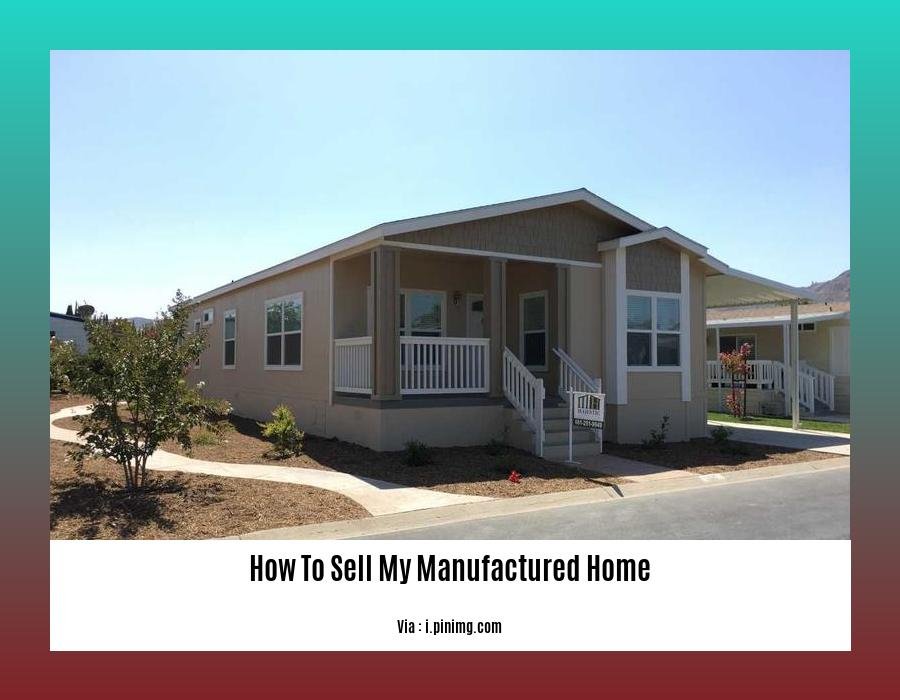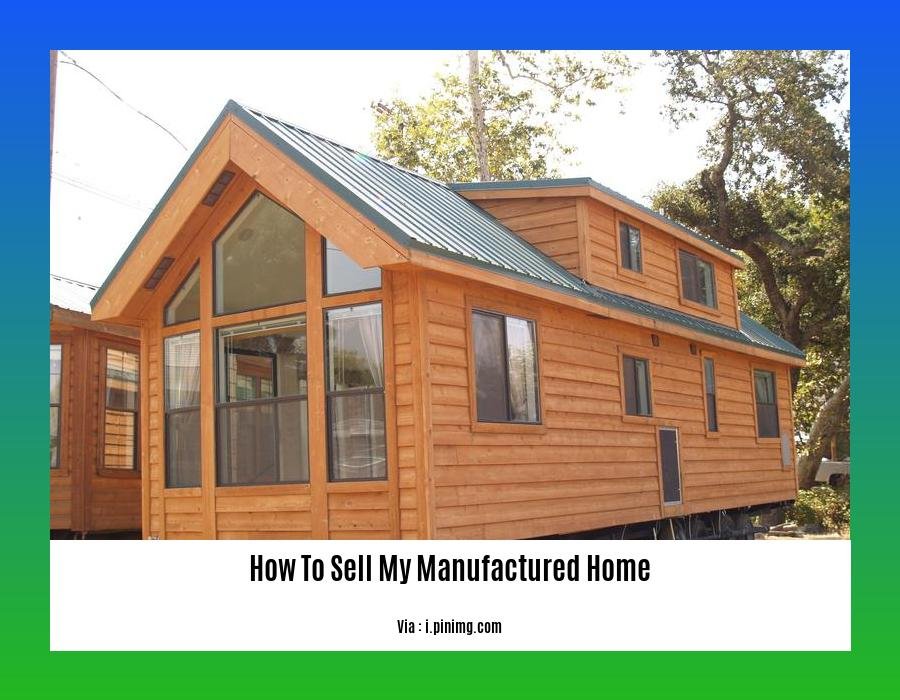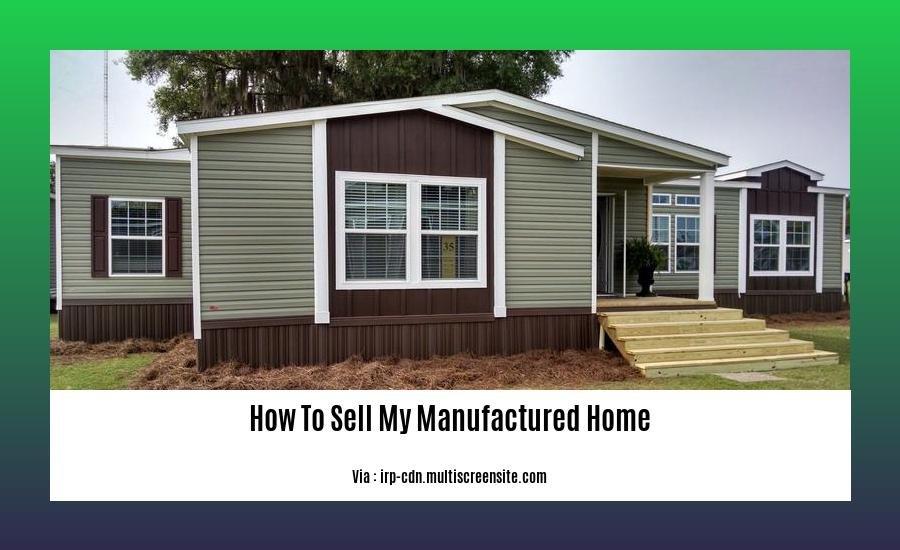In the realm of real estate, manufactured homes offer unique opportunities for buyers and sellers seeking affordability, flexibility, and customization. If you’re considering selling your manufactured home, [- How to Sell My Manufactured Home: A Comprehensive Guide for Homeowners] will guide you through the intricate process seamlessly. Whether you’re a seasoned homeowner or a first-time seller, this comprehensive resource will provide valuable insights, expert advice, and practical steps to help you navigate the market, maximize your profits, and find the perfect buyer for your manufactured home.
Key Takeaways:
-
Accentuate the positive features of your manufactured home in marketing materials.
-
Set a fair asking price based on market value and condition.
-
Create attractive marketing materials, including photos, descriptions, and a virtual tour.
-
List your manufactured home on MHVillage, the nation’s leading marketplace for mobile and manufactured homes.
-
Clean up the landscaping and enhance the property’s curb appeal to attract buyers.
-
Improve the exterior appearance of your manufactured home by pressure washing and/or painting it.
-
Clean, organize, and decorate the interior of your home to make it inviting and appealing to potential buyers.
-
Explore various financing options to expand your buyer pool and make your home more attractive to a wider range of buyers.
-
Consider three options for selling your manufactured home: doing it yourself, using a realtor, or selling it to a company specializing in buying mobile homes.
-
Be aware of the legal requirements and paperwork involved in selling a manufactured home in your area.
Relevant Sources:
-
Selling a Manufactured Home by Owner: Tips and Strategies
-
Can I Sell My Mobile Home and Keep The Land?
How to Sell My Manufactured Home: A Comprehensive Guide for Homeowners

Selling a manufactured home requires a strategic approach that takes into account its unique features and market dynamics. Here’s a comprehensive guide to help you navigate the process seamlessly:
1. Prepare Your Manufactured Home for Sale
- Enhance Curb Appeal: Spruce up the exterior with landscaping, pressure washing, and a fresh coat of paint.
- Clean and Organize: Deep clean and declutter your home, creating a welcoming and neutral space.
- Stage Your Home: Arrange furniture and décor to highlight the home’s best features.
2. Determine a Fair Asking Price
- Research Local Market: Analyze recent sales and current listings to determine a competitive asking price.
- Consider Home Condition: Factor in the age, condition, and upgrades to your manufactured home.
3. Create Compelling Marketing Materials
- High-Quality Photos: Use well-lit, professional photos to showcase your home’s interior and exterior.
- Detailed Description: Write a comprehensive description highlighting your home’s unique features and amenities.
- Virtual Tour: Create a virtual tour to give potential buyers a comprehensive view of your home.
4. Market Your Manufactured Home
- Online Listings: List your home on reputable online marketplaces and classified websites.
- Yard Signs: Display a prominent sign in front of your home to attract potential buyers.
- Social Media: Leverage social media platforms to promote your home and reach a wider audience.
5. Manage Showings and Offers
- Arrange Showings: Coordinate showings with qualified buyers and ensure your home is presentable.
- Negotiate Offers: Review offers carefully and negotiate to get the best possible price and terms.
6. Finalize the Sale
- Complete Necessary Paperwork: Work with a real estate attorney to handle legal documents and ensure a smooth transaction.
- Home Inspection: Schedule a home inspection to address any issues that may affect the sale.
- Close on the Sale: Attend the closing to sign the final documents and transfer ownership.
Additional Tips for a Successful Sale:
- Price Your Home Strategically: Striking the right balance between competitiveness and profitability is crucial for attracting buyers and maximizing your returns.
- Work with Experienced Professionals: Consider hiring a real estate agent specializing in manufactured homes to leverage their expertise and network.
- Stage Your Home Professionally: Staging can significantly impact a buyer’s perception of your home, making it more appealing and desirable.
- Be Patient: Selling a manufactured home may take longer than selling a traditional home, so be prepared for the process to take some time.
-
If you’re wanting to sell your mobile home quickly, check out how to sell my mobile home to secure a good deal and close the deal stress-free.
-
Looking to sell your motorhome? Our guide how to sell my motorhome delivers practical tips to get top-dollar for your RV.
-
Are you seeking to learn the nitty-gritty of setting up a mobile home? Dive into how to set up a mobile home to ensure a smooth transition to your new abode.
-
Discover the ins and outs of starting a used car business from the comfort of your home with how to start a used car business from home.
Price your home based on the market and buyer demographics

Pricing your manufactured home strategically is crucial for attracting the right buyers and obtaining a fair market value. As you determine the asking price, consider the following factors:
Market Conditions:
- Research recent sales of comparable manufactured homes in your area. Determine the median price per square foot and the average days on the market.
- Assess current market trends. Is it a buyer’s or seller’s market? Are prices rising or falling?
Property Condition:
- Evaluate the condition of your manufactured home honestly. Consider factors such as age, upkeep, and any necessary repairs.
- Address any necessary repairs or renovations before listing your home. This can increase its value and appeal to potential buyers.
Buyer Demographics:
- Understand the local buyer demographics and preferences. Consider the age, income level, and lifestyle of your target buyers.
- Highlight features that cater to the needs and desires of your target market. For example, if you’re targeting retirees, emphasize the community’s amenities and proximity to healthcare facilities.
Competitive Pricing:
- Analyze the prices of similar manufactured homes in your area. Price your home competitively to attract buyers without undercutting its value.
- Be prepared to negotiate with potential buyers. Having a flexible pricing strategy can help you reach an agreement that benefits both parties.
Key Takeaways:
- Research the local market: Understand current trends, prices, and buyer demographics.
- Evaluate your property’s condition: Make necessary repairs or renovations to enhance its value.
- Consider buyer demographics: Tailor your marketing and pricing strategy to appeal to your target buyers.
- Price your home competitively: Analyze comparable properties and be prepared to negotiate.
Sources:
How to Price Your Manufactured Home to Sell
Pricing Your Manufactured Home
Expand your buyer pool with various financing options
When selling a manufactured home, expanding your buyer pool is crucial to ensure a successful sale. Offering diverse financing options can attract a wider range of potential buyers and increase the chances of finding the right buyer for your property. Here are some key points to consider when exploring various financing options:
Research Available Financing Options:
- Government-Backed Loans:
- Investigate government-backed loan programs such as FHA (Federal Housing Administration) and VA (Veterans Administration) loans.
-
These loans offer favorable terms and can make manufactured homes more affordable for potential buyers.
-
Chattel Loans:
- Explore chattel loans specifically designed for manufactured homes.
-
These loans are secured by the manufactured home itself and typically have higher interest rates than traditional mortgages.
-
Personal Loans:
- Consider personal loans as an option for buyers who may not qualify for traditional mortgage or chattel loans.
-
Personal loans are unsecured and have higher interest rates but can provide flexibility for buyers with less-than-perfect credit.
-
Seller Financing:
- Offer seller financing options, allowing buyers to purchase the manufactured home with a down payment and make monthly payments directly to you.
- This option can be attractive to buyers with limited cash for a down payment.
Highlight Financing Options in Marketing Materials:
- Include Financing Information:
- Clearly state the available financing options in your marketing materials, including loan programs, interest rates, and down payment requirements.
-
Make it easy for potential buyers to understand the financing options available to them.
-
Create Financing Flyers:
- Design flyers or brochures that specifically highlight the various financing options for manufactured homes.
- Distribute these materials at open houses, showings, and other marketing events.
Work with Lenders and Real Estate Agents:
- Partner with Lenders:
- Collaborate with local lenders or mortgage brokers who specialize in manufactured home financing.
-
They can provide valuable insights into the available loan programs and help potential buyers navigate the financing process.
-
Educate Real Estate Agents:
- Educate real estate agents about the unique financing options available for manufactured homes.
- Ensure they are knowledgeable about the benefits and requirements of each financing option to better assist potential buyers.
Key Takeaways:
- Government-backed loans, chattel loans, personal loans, and seller financing: are available financing options for manufactured homes.
- Highlighting financing options: in marketing materials and working with lenders and real estate agents can expand the buyer pool.
- Collaborating with lenders: can provide valuable insights into financing options and help potential buyers navigate the financing process.
- Educating real estate agents: about financing options can ensure they effectively assist potential buyers.
Relevant Sources:
1. Fannie Mae: Manufactured Housing
2. U.S. Department of Housing and Urban Development (HUD): Manufactured Home Loans
FAQ
Q1: Why is it essential to partner with an experienced local agent when selling a manufactured home?
A1: Working with an experienced local agent specializing in mobile home sales is crucial because they possess in-depth knowledge of the unique aspects of these properties. They can guide you through contract negotiations, disclosures, repairs, upgrades, and marketing strategies specific to manufactured homes, ensuring a smooth and successful selling process.
Q2: What is the purpose of conducting a pre-listing appraisal before selling a manufactured home?
A2: A pre-listing appraisal helps you accurately determine the value of your manufactured home before listing it on the market. An appraiser will examine the area, locate the HUD Data Plate/Compliance Certification, and assess the home’s condition to provide an informed valuation. This information allows you to set a competitive asking price and avoid overpricing or underpricing your property.
Q3: How can pricing a manufactured home competitively impact its saleability?
A3: Pricing your manufactured home competitively is essential to attract a wider pool of potential buyers and increase its saleability. Manufactured homes are generally more affordable than stick-built homes, making them an attractive option for budget-conscious buyers. By researching the local housing market and considering buyer demographics, you can set a price that aligns with market conditions and buyer expectations, resulting in a faster and more successful sale.
Q4: What are the benefits of expanding the buyer pool with various financing options when selling a manufactured home?
A4: Expanding the buyer pool through financing options can significantly increase the chances of selling your manufactured home quickly and for a fair price. By offering financing options such as conventional loans, government-insured loans, chattel loans, or owner financing, you cater to a wider range of buyers, including those with limited cash or who prefer financing options tailored to manufactured homes. This opens up your property to a larger pool of potential buyers, increasing the demand and likelihood of a successful sale.
Q5: Which home improvements or upgrades can potentially increase the value of a manufactured home before selling it?
A5: Prioritizing certain home improvements and upgrades can enhance the value of your manufactured home and make it more appealing to potential buyers. Consider investing in features like decks, porches, and screened-in porches, as these add to the home’s functionality and curb appeal. Additionally, addressing any structural issues or repairs, such as roof maintenance, siding repairs, or plumbing upgrades, can increase the home’s value and make it more attractive to buyers. By focusing on improvements that enhance both the aesthetic and functional aspects of your manufactured home, you can increase its desirability and potentially sell it for a higher price.
- Kitchen Backsplash For White Kitchen: Ideas To Inspire Your Renovation - November 21, 2025
- White On White Kitchen Backsplash: Is It Timeless? - November 20, 2025
- Backsplash Colors for White Cabinets: Find Your Perfect Match - November 19, 2025










